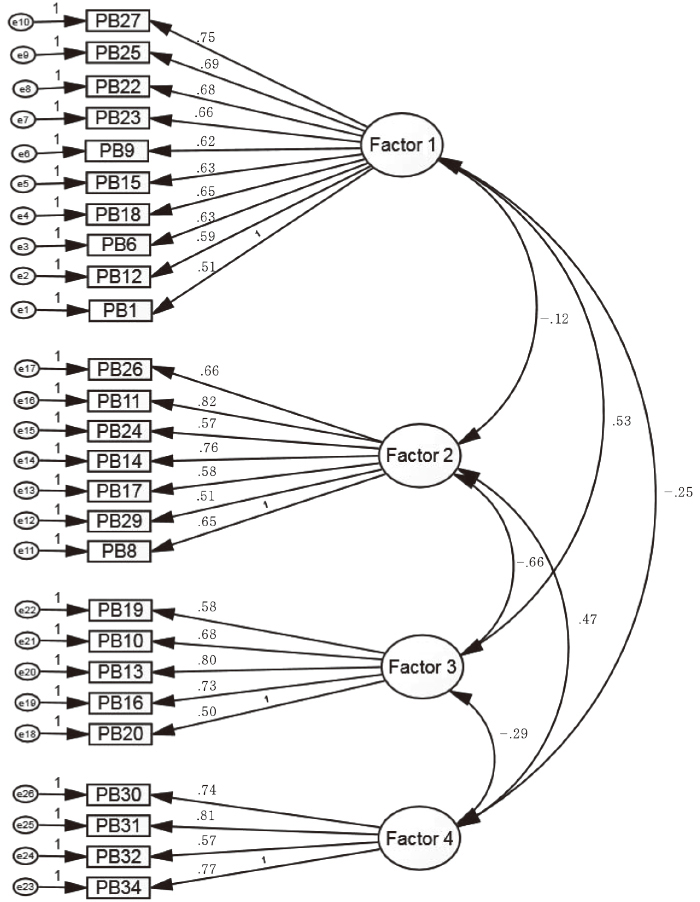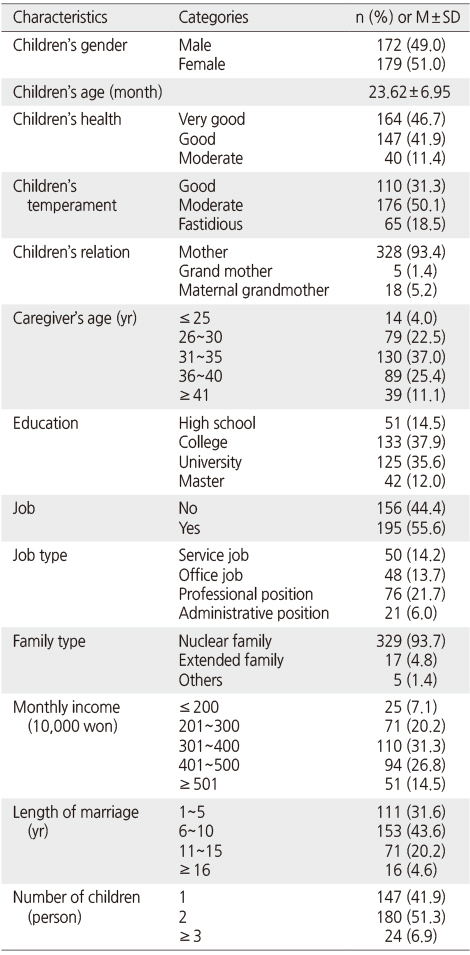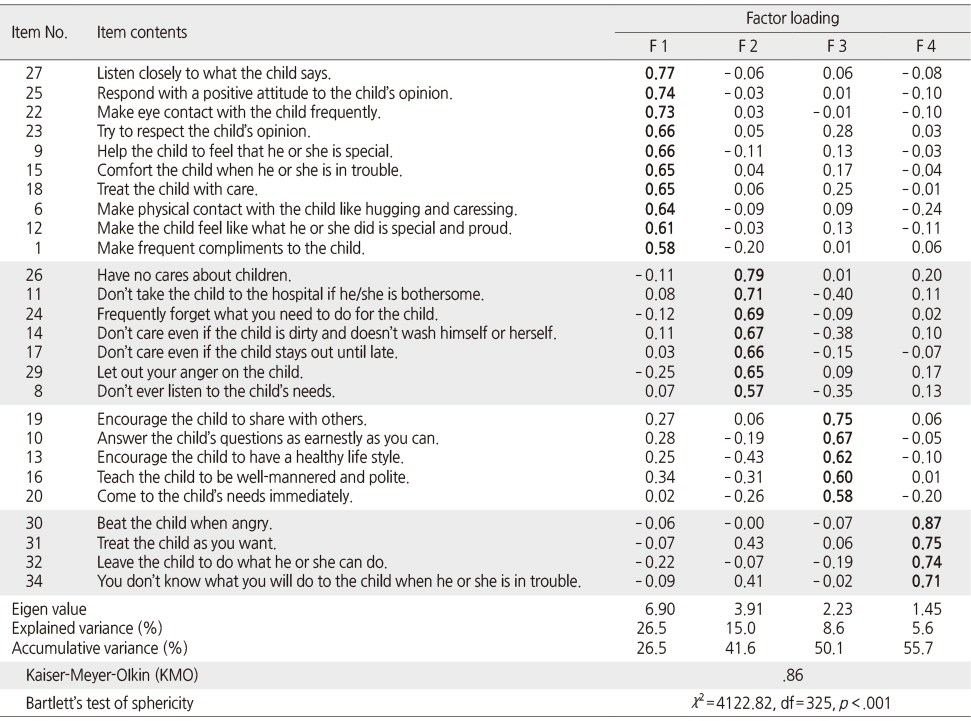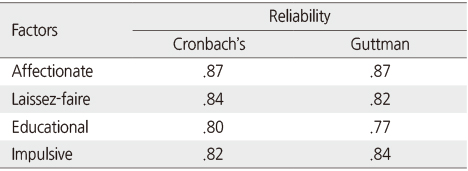Articles
- Page Path
- HOME > J Korean Acad Nurs > Volume 45(5); 2015 > Article
-
Original Article
- Development of a Measurement Instrument for Parenting Behavior of Primary Caregivers in Early Childhood
- Sun-Jung Park, Kyung-Ah Kang
-
Journal of Korean Academy of Nursing 2015;45(5):650-660.
DOI: https://doi.org/10.4040/jkan.2015.45.5.650
Published online: October 30, 2015
1Department of Nursing, Yeoju Institute of Technology, Yeoju, Korea.
2Department of Nursing, Sahmyook University, Seoul, Korea.
- Address reprint requests to: Kang, Kyung-Ah. Department of Nursing, Sahmyook University, 815 Hwarang-ro, Nowon-gu, Seoul 01795, Korea. Tel: +82-2-3399-1585, Fax: +82-2-3399-1594, kangka@syu.ac.kr
• Received: February 9, 2015 • Revised: February 25, 2015 • Accepted: May 6, 2015
© 2015 Korean Society of Nursing Science
This is an Open Access article distributed under the terms of the Creative Commons Attribution NoDerivs License. (http://creativecommons.org/licenses/by-nd/4.0/) If the original work is properly cited and retained without any modification or reproduction, it can be used and re-distributed in any format and medium.
Abstract
-
Purpose
- The purpose of this study was to develop an instrument to measure the parenting behavior of primary caregivers of children in early childhood.
-
Methods
- An instrument was developed according to Devellis's instrument development process. The participants in this study who completed the main survey were 370 mothers and grandmothers. The survey was conducted from June 1 to July 30, 2014, and collected data were analyzed using item analysis, half-split reliability and Cronbach's α coefficient, exploratory and confirmatory factor analysis, convergent validity.
-
Results
- The factor structure of the instrument showed the cumulative variance as 55.7% in the factor analysis. As a result of a confirmatory factor analysis, a four-factor structure was found to be appropriate, and the construct validity and convergent validity of the instrument were thereby confirmed. The finalized parenting behavior instrument consisted of 26 items and four independent factors: affectionate, laissez-faire, educational and impulsive. A five-point Likert scale was employed, and a higher score in a particular factor showed that most of the behaviors belonged to the factor.
-
Conclusion
- The instrument developed in this study was found to be reliable and valid, and can be used to develop parent-child relationship building.
- 1. Park SS, Park YH. The relationship among rearing environment attachment and self-identity. J Human Stud. 2005;19:41–62.
- 2. Kang JH, Oh KJ. Gender differences in the effects of preschoolers' age, temperament and parenting for internalizing and externalizing problems. Korean J Woman Psychol. 2011;16(1):1–21.Article
- 3. Kim HK, Yoo MS. The effects of parenting behaviors and children's playfulness on emotional intelligence. Korean J Child Stud. 2010;31(5):115–130.
- 4. Lim ST, Khu SS. Comparing the effects of family structural and parenting environments on children's maladjusted emotional behaviors. J Child Educ. 2006;15(3):115–131.
- 5. Park SJ. Content analysis of child rearings of mothers in infant and child preschool. Child Health Nurs Res. 2014;20(1):39–48. ArticlePDF
- 6. Rhee S. The study for the development and validation of parenting behavior scale' parents with school-age children [dissertation]. Seoul, Ewha Womans University. 2012.
- 7. Kim HS, Kang KA, Kim SJ, Kim HO, Moon SY, Park SN, et al. Child · adolescence health nursing. Seoul: Koonja; 2013.
- 8. Choi MK. The relationship between mothers' parenting, children's self-esteem, and stress. Korean J Child Stud. 2011;32(2):105–121.Article
- 9. Kim KS, Song YA. Human growth · development & health across the life span. Seoul: Shinkwang; 2013.
- 10. Fuligni AJ. The academic achievement of adolescents from immigrant families: The roles of family background, attitudes, and behavior. Child Dev. 1997;68(2):351–363.ArticlePubMed
- 11. Kim MS, Moon HJ. Relationship between parenting stress and parenting efficacy on parenting behaviors in mother with young children. J Korean Home Econ Assoc. 2005;43(8):25–35.
- 12. Darling N, Steinberg L. Parenting style as context: An integrative model. Psychol Bull. 1993;113(3):487–496. Article
- 13. Kim S, Kim A. Development and validation of the perceived mother's parenting behavior scale: An application of the self-determination theory. Korean J Educ Psychol. 2012;26(3):717–738.
- 14. Park SY, Lee S. A preliminary study for the standardization of the ⌜Korean maternal behavior inventory⌟. Fam Environ Res. 1990;28(1):141–156.
- 15. Oh SS, Lee JS. Way of parenting and the child's perception of the relationship between characteristics and definitions. Korea Inst Behav Sci Stud Notes. 1982;11(1):1–15.
- 16. Lim JH, Chung OB. Development and initial validation of the Korean parenting inventory. Korean J Hum Dev. 2004;11(4):55–73.
- 17. Jeong GY, Shin HC. Validation of the Korean version of parents as social context questionnaire (PSCQ). Korean J Couns. 2011;12(4):1287–1305.Article
- 18. Huh MY. A study for the development and validation of an inventory for parenting behavior perceived by adolescents. Korean J Youth Couns. 2004;12(2):170–189.
- 19. Perris C, Jacobsson L, Lindström H, von Knorring L, Perris H. Development of a new inventory assessing memories of parental rearing behaviour. Acta Psychiatr Scand. 1980;61(4):265–274.ArticlePubMed
- 20. DeVellis RF. Scale development: Theory and applications. 3rd ed. Thousand Oaks, CA: Sage Publications, Inc.; 2012.
- 21. Park SJ, Kang KA, Kim SJ. Types of child rearing behavior of parents during early childhood: Q-methodological approach. J Korean Acad Nurs. 2013;43(4):486–496. ArticlePubMed
- 22. Park SJ, Kim SJ, Kang KA. Integrative review of nursing intervention studies on mother-infant interactions. Child Health Nurs Res. 2014;20(2):75–86. ArticlePDF
- 23. Nunnally JC, Bernstein IH. Psychometric theory. 3rd ed. New York, NY: McGraw Hill; 1994.
- 24. Han SS, Lee SC. SPSS nursing and health statistical analaysis. Seoul: Hyunmoon; 2006.
- 25. Cho SB. LISREL structural equation model. Seoul: Youngji Publishers; 2000.
- 26. Minjung Publishing Co.Minjung's essence Korean-English dictionary. Paju: Author; 2013.
- 27. Kim GS. New AMOS 16.0 analysis structural equation modeling. Seoul: Hannarae Publishing Co.; 2007.
- 28. Kaplan RM, Saccuzzo DP. Psychological testing: Principles, applications, and issues. 5th ed. Belmont, CA: Wadsworth/Thomson Learning; 2009.
- 29. Park HJ. Development and validation of dysfunctional parenting scale [dissertation]. Seoul, Korea University. 2010.
REFERENCES
Figure & Data
REFERENCES
Citations
Citations to this article as recorded by 

- Maternal identity measurement based on the experiences of mothers with infants: a methodological study
Sun jung Park, Eun young Choi
Women's Health Nursing.2025; 31(1): 46. CrossRef - Research trends over 10 years (2010-2021) in infant and toddler rearing behavior by family caregivers in South Korea: text network and topic modeling
In-Hye Song, Kyung-Ah Kang
Child Health Nursing Research.2023; 29(3): 182. CrossRef - Reliability and Validity of Korean Version of the Child Abuse Potential Inventory
Sona Lee, Hye Young Ahn
Child Health Nursing Research.2019; 25(2): 85. CrossRef - Motherhood Ideology and Parenting Stress according to Parenting Behavior Patterns of Married Immigrant Women with Young Children
So-Hyun Moon, Miok Kim, Hyeun Na
Journal of Korean Academy of Nursing.2019; 49(4): 449. CrossRef
Development of a Measurement Instrument for Parenting Behavior of Primary Caregivers in Early Childhood

Figure 1
Confirmatory factor analysis.
Figure 1
Development of a Measurement Instrument for Parenting Behavior of Primary Caregivers in Early Childhood
Demographic Characteristics of Participants (N=351)
Factor Analysis (N=351)
Model Fit Statistics by Confirmatory Factor Analysis
Factor Reliability (N=351)
Table 1
Demographic Characteristics of Participants (N=351)
Table 2
Factor Analysis (N=351)
Table 3
Model Fit Statistics by Confirmatory Factor Analysis
Table 4
Factor Reliability (N=351)
 KSNS
KSNS
 E-SUBMISSION
E-SUBMISSION





 Cite
Cite

